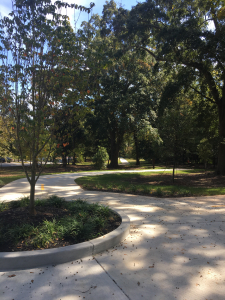
By: Aaron Klingensmith, General Sustainability Intern, Office of Sustainability Initiatives
The Atlanta PATH, a system of paved walking and biking trails around the city, added to its network of trails on Emory’s campus over the summer. The new PATH trail extension runs from the previously constructed trail down North Decatur Road and turns to run alongside Haygood Drive from North Decatur Road to Clifton Road. On the North Decatur Road end, it connects to Westminster Way in front of the Emory Presbyterian Church.
The planning of Emory’s PATH network began in 2016 with the formation of a partnership between the University and PATH Foundation. PATH Foundation is a local nonprofit that has been working since 1991 to envision and create an Atlanta region connected by extensive and safe bike and pedestrian corridors. The first PATH trail at Emory was opened in spring of 2018 and connected the Clairmont campus with the South Peachtree Fork PATH. Since then, the Clifton Road, North Decatur Road, and Haygood Drive trails have been established. Future expansion of the trail networks on campus and connecting to campus is planned, including a trail along Eagle Row and Means Drive leading to the Emory Student Center and a trail along Starvine Way connecting main campus with the Clairmont campus.
Biking, jogging, and walking are great ways to get exercise and release stress in the pandemic, and the PATH options on campus, in addition to Lullwater Park and the South Peachtree Fork PATH network, provide plenty of opportunities for that nearby. The network expansion has also been very useful for commuters in the Emory community. “I now regularly use the new PATH down Haygood and the section on North Decatur on my commute,” said Dr. Ben Lopman, a professor at Emory’s Rollins School of Public Health and frequent bike commuter. “I commute from the Great Lakes [Decatur] area, so I hope the PATH’s extension plans continue and can eventually connect Emory’s campus to Decatur.”
While commuting to campus by bike and on foot has been possible in the past, it is now safer and easier by way of the growing PATH network. Emory hopes to see more and more commuters choose to travel by bike or foot rather than by car in the next few years as a result of the PATH network. This would continue Emory’s trend over the past decade of reducing its carbon footprint related to staff, faculty, and student commutes. Between 2010 and 2019, Emory’s commuting-related emissions decreased by 58.5% due in large part to the expansion of carbon-free commuting and the Emory community choosing these sustainable commutes. Even so, commuting makes up almost 10% of Emory’s carbon footprint, and Emory will continue to seek ways to reduce these emissions as it strives to reach net carbon neutrality by 2050.
To find out more about PATH Foundation, please visit its website at https://www.pathfoundation.org/. You can also explore maps of the network on the website to create your own self-guided tour.
